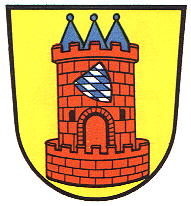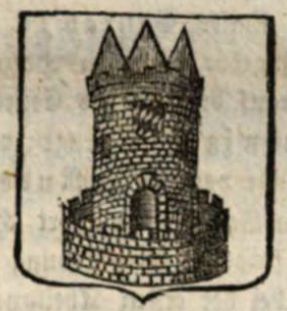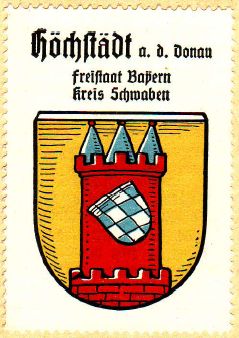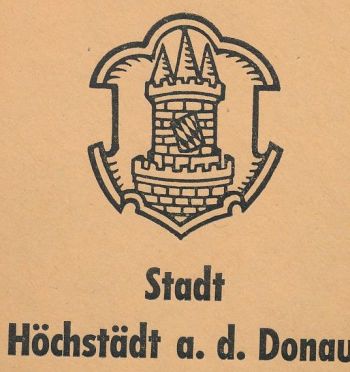Höchstadt an der Donau: Difference between revisions
Knorrepoes (talk | contribs) |
Knorrepoes (talk | contribs) m (Text replacement - "===Official blazon=== In" to "===Official blazon=== *(de) In") |
||
| Line 9: | Line 9: | ||
===Official blazon=== | ===Official blazon=== | ||
In Gold ein zinnengekrönter roter Rundturm mit drei blauen Spitzdächern, der oben mit einem gelehnten Rautenschild belegt und unten von einer roten Zinnenmauer umgeben ist. | *(de) In Gold ein zinnengekrönter roter Rundturm mit drei blauen Spitzdächern, der oben mit einem gelehnten Rautenschild belegt und unten von einer roten Zinnenmauer umgeben ist. | ||
===Origin/meaning=== | ===Origin/meaning=== | ||
Revision as of 07:44, 29 April 2021
This page is part of the German heraldry portal Deutsche Wappensammlung |
Heraldry of the World |
|
German heraldry:
|
Selected collector's items from Germany:
|
HÖCHSTADT AN DER DONAU
State : Bayern
District (Kreis) : Dillingen an der Donau
Additions : 1978 Deisenhofen, Oberglauheim, Schwennenbach, Sonderheim
Official blazon
- (de) In Gold ein zinnengekrönter roter Rundturm mit drei blauen Spitzdächern, der oben mit einem gelehnten Rautenschild belegt und unten von einer roten Zinnenmauer umgeben ist.
Origin/meaning
Höchstadt is known since the 11th century and was in the 12th century a possession of the Staufen dynasty, which had a vassal living in the local castle. A Lord Ulrich of Hochstetten is mentioned in the last decennium of the 12th century. When Höchstadt became city is not clear. Castle and city became a possession of the Kings of Bayern in 1268.
The oldest known seal of the city is known since 1321, and shows a tower, standing on a mountain. This may be a canting image (the name means High-city). On the tower a small shield with the Bavarian arms can be seen. In later seals the basic image remains the same, but the building itself sometimes has one, sometimes three towers. Since the 16th century the tower is round and has the three small towers as in the present arms. The small Bavarian shield is always present. The colours are also known from the same century (roll of arms of 1555). The present arms have thus not basically changed since the 13th century and were granted in 1819.
| The arms in Kramer (1841) |
The arms by Hupp in the Kaffee Hag albums +/- 1925 |
| Municipal stationery, 1960s |
Contact and Support
Partners:
Your logo here ?
Contact us
© since 1995, Heraldry of the World, Ralf Hartemink 
Index of the site
Literature : Stadler, 1964-1971, 8 volumes.















